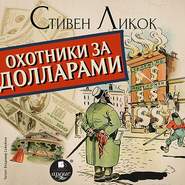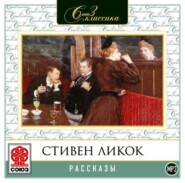По всем вопросам обращайтесь на: info@litportal.ru
(©) 2003-2024.
✖
Frenzied Fiction
Автор
Год написания книги
2019
Настройки чтения
Размер шрифта
Высота строк
Поля
As we took our seats I looked again at my companion; this time more closely. Father Knickerbocker he certainly was, yet somehow strangely transformed from my pictured fancy of the Sleepy Hollow days. His antique coat with its wide skirt had, it seemed, assumed a modish cut as if in imitation of the bell-shaped spring overcoat of the young man about town. His three-cornered hat was set at a rakish angle till it looked almost like an up-to-date fedora. The great stick that he used to carry had somehow changed itself into the curved walking-stick of a Broadway lounger. The solid old shoes with their wide buckles were gone. In their place he wore narrow slippers of patent leather of which he seemed inordinately proud, for he had stuck his feet up ostentatiously on the seat opposite. His eyes followed my glance toward his shoes.
“For the fox-trot,” he said. “The old ones were no good. Have a cigarette? These are Armenian, or would you prefer a Honolulan or a Nigerian? Now,” he resumed, when we had lighted our cigarettes, “what would you like to do first? Dance the tango? Hear some Hawaiian music, drink cocktails, or what?”
“Why, what I should like most of all, Father Knickerbocker—”
But he interrupted me.
“There’s a devilish fine woman! Look, the tall blonde one! Give me blondes every time!” Here he smacked his lips. “By gad, sir, the women in this town seem to get finer every century. What were you saying?”
“Why, Father Knickerbocker,” I began, but he interrupted me again.
“My dear fellow,” he said. “May I ask you not to call me Father Knickerbocker?”
“But I thought you were so old,” I said humbly.
“Old! Me old! Oh, I don’t know. Why, dash it, there are plenty of men as old as I am dancing the tango here every night. Pray call me, if you don’t mind, just Knickerbocker, or simply Knicky—most of the other boys call me Knicky. Now what’s it to be?”
“Most of all,” I said, “I should like to go to some quiet place and have a talk about the old days.”
“Right,” he said. “We’re going to just the place now—nice quiet dinner, a good quiet orchestra, Hawaiian, but quiet, and lots of women.” Here he smacked his lips again, and nudged me with his elbow. “Lots of women, bunches of them. Do you like women?”
“Why, Mr. Knickerbocker,” I said hesitatingly, “I suppose—I—”
The old man sniggered as he poked me again in the ribs.
“You bet you do, you dog!” he chuckled. “We all do. For me, I confess it, sir, I can’t sit down to dinner without plenty of women, stacks of them, all round me.”
Meantime the taxi had stopped. I was about to open the door and get out.
“Wait, wait,” said Father Knickerbocker, his hand upon my arm, as he looked out of the window. “I’ll see somebody in a minute who’ll let us out for fifty cents. None of us here ever gets in or out of anything by ourselves. It’s bad form. Ah, here he is!”
A moment later we had passed through the portals of a great restaurant, and found ourselves surrounded with all the colour and tumult of a New York dinner a la mode. A burst of wild music, pounded and thrummed out on ukuleles by a group of yellow men in Hawaiian costume, filled the room, helping to drown or perhaps only serving to accentuate the babel of talk and the clatter of dishes that arose on every side. Men in evening dress and women in all the colours of the rainbow, decollete to a degree, were seated at little tables, blowing blue smoke into the air, and drinking green and yellow drinks from glasses with thin stems. A troupe of cabaret performers shouted and leaped on a little stage at the side of the room, unheeded by the crowd.
“Ha ha!” said Knickerbocker, as we drew in our chairs to a table. “Some place, eh? There’s a peach! Look at her! Or do you like better that lazy-looking brunette next to her?”
Mr. Knickerbocker was staring about the room, gazing at the women with open effrontery, and a senile leer upon his face. I felt ashamed of him. Yet, oddly enough, no one about us seemed in the least disturbed.
“Now, what cocktail will you have?” said my companion. “There’s a new one this week, the Fantan, fifty cents each, will you have that? Right? Two Fantans. Now to eat—what would you like?”
“May I have a slice of cold beef and a pint of ale?”
“Beef!” said Knickerbocker contemptuously. “My dear fellow, you can’t have that. Beef is only fifty cents. Do take something reasonable. Try Lobster Newburg, or no, here’s a more expensive thing—Filet Bourbon a la something. I don’t know what it is, but by gad, sir, it’s three dollars a portion anyway.”
“All right,” I said. “You order the dinner.”
Mr. Knickerbocker proceeded to do so, the head-waiter obsequiously at his side, and his long finger indicating on the menu everything that seemed most expensive and that carried the most incomprehensible name. When he had finished he turned to me again.
“Now,” he said, “let’s talk.”
“Tell me,” I said, “about the old days and the old times on Broadway.”
“Ah, yes,” he answered, “the old days—you mean ten years ago before the Winter Garden was opened. We’ve been going ahead, sir, going ahead. Why, ten years ago there was practically nothing, sir, above Times Square, and look at it now.”
I began to realize that Father Knickerbocker, old as he was, had forgotten all the earlier times with which I associated his memory. There was nothing left but the cabarets, and the Gardens, the Palm Rooms, and the ukuleles of to-day. Behind that his mind refused to travel.
“Don’t you remember,” I asked, “the apple orchards and the quiet groves of trees that used to line Broadway long ago?”
“Groves!” he said. “I’ll show you a grove, a coconut grove”—here he winked over his wineglass in a senile fashion—“that has apple-trees beaten from here to Honolulu.” Thus he babbled on.
All through our meal his talk continued: of cabarets and dances, or fox-trots and midnight suppers, of blondes and brunettes, “peaches” and “dreams,” and all the while his eye roved incessantly among the tables, resting on the women with a bold stare. At times he would indicate and point out for me some of what he called the “representative people” present.
“Notice that man at the second table,” he would whisper across to me. “He’s worth all the way to ten millions: made it in Government contracts; they tried to send him to the penitentiary last fall but they can’t get him—he’s too smart for them! I’ll introduce you to him presently. See the man with him? That’s his lawyer, biggest crook in America, they say; we’ll meet him after dinner.” Then he would suddenly break off and exclaim: “Egad, sir, there’s a fine bunch of them,” as another bevy of girls came trooping out upon the stage.
“I wonder,” I murmured, “if there is nothing left of him but this? Has all the fine old spirit gone? Is it all drowned out in wine and suffocated in the foul atmosphere of luxury?”
Then suddenly I looked up at my companion, and I saw to my surprise that his whole face and manner had altered. His hand was clenched tight on the edge of the table. His eyes looked before him—through and beyond the riotous crowd all about him—into vacancy, into the far past, back into memories that I thought forgotten. His face had altered. The senile, leering look was gone, and in its place the firm-set face of the Knickerbocker of a century ago.
He was speaking in a strange voice, deep and strong.
“Listen,” he said, “listen. Do you hear it—there—far out at sea—ships’ guns—listen—they’re calling for help—ships’ guns—far out at sea!” He had clasped me by the arm. “Quick, to the Battery, they’ll need every man to-night, they’ll—”
Then he sank back into his chair. His look changed again. The vision died out of his eyes.
“What was I saying?” he asked. “Ah, yes, this old brandy, a very special brand. They keep it for me here, a dollar a glass. They know me here,” he added in his fatuous way. “All the waiters know me. The headwaiter always knows me the minute I come into the room—keeps a chair for me. Now try this brandy and then presently we’ll move on and see what’s doing at some of the shows.”
But somehow, in spite of himself, my companion seemed to be unable to bring himself fully back into the consciousness of the scene before him. The far-away look still lingered in his eyes.
Presently he turned and spoke to me in a low, confidential tone.
“Was I talking to myself a moment ago?” he asked. “Yes? Ah, I feared I was. Do you know—I don’t mind telling it to you—lately I’ve had a strange, queer feeling that comes over me at times, as if something were happening—something, I don’t know what. I suppose,” he continued, with a false attempt at resuming his fatuous manner, “I’m going the pace a little too hard, eh! Makes one fanciful. But the fact is, at times”—he spoke gravely again—“I feel as if there were something happening, something coming.”
“Knickerbocker,” I said earnestly, “Father Knickerbocker, don’t you know that something is happening, that this very evening as we are sitting here in all this riot, the President of the United States is to come before Congress on the most solemn mission that ever—”
But my speech fell unheeded. Knickerbocker had picked up his glass again and was leering over it at a bevy of girls dancing upon the stage.
“Look at that girl,” he interrupted quickly, “the one dancing at the end. What do you think of her, eh? Some peach!”
Knickerbocker broke off suddenly. For at this moment our ears caught the sound of a noise, a distant tumult, as it were, far down the street and growing nearer. The old man had drawn himself erect in his seat, his hand to his ear, listening as he caught the sound.
“Out on the Broad Way,” he said, instinctively calling it by its ancient name as if a flood of memories were upon him. “Do you hear it? Listen—listen—what is it? I’ve heard that sound before—I’ve heard every sound on the Broad Way these two centuries back—what is it? I seem to know it!”
The sound and tumult as of running feet and of many voices crying came louder from the street. The people at the tables had turned in their seats to listen. The music of the orchestra had stopped. The waiters had thrown back the heavy curtains from the windows and the people were crowding to them to look out into the street. Knickerbocker had risen in his place, his eyes looked toward the windows, but his gaze was fixed on vacancy as with one who sees a vision passing.
“I know the sound,” he cried. “I see it all again. Look, can’t you see them? It’s Massachusetts soldiers marching South to the war—can’t you hear the beating of the drums and the shrill calling of the fife—the regiments from the North, the first to come. I saw them pass, here where we are sitting, sixty years ago—”
Knickerbocker paused a moment, his hand still extended in the air, and then with a great light upon his face he cried:
“I know it now! I know what it meant, the feeling that has haunted me—the sounds I kept hearing—the guns of the ships at sea and the voices calling in distress! I know now. It means, sir, it means—”
Другие электронные книги автора Стивен Батлер Ликок
Другие аудиокниги автора Стивен Батлер Ликок
Рассказы




 4.67
4.67













